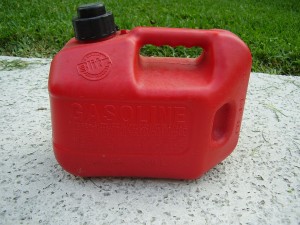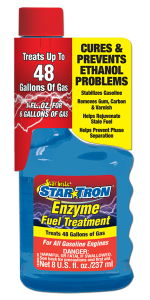 Look at the manual for any small engine equipment, Cub Cadet or otherwise, and you’ll see the manufacturer recommending the use of a fuel stabilizer. Is this really necessary? Why is it recommended for small equipment and not automobiles?
Look at the manual for any small engine equipment, Cub Cadet or otherwise, and you’ll see the manufacturer recommending the use of a fuel stabilizer. Is this really necessary? Why is it recommended for small equipment and not automobiles?
Why Doesn’t Fuel Last?
Small engine equipment uses fuel more slowly than a car or truck, and this equipment is run off of fuel stored in containers rather than bought fresh from a gas station. That means this fuel tends to be older than what you find in your car. Modern gasoline ages pretty quickly, resulting in starting problems and other issues, although the root cause of this aging varies depending on the fuel formulation.
Ethanol is hygroscopic, which means it actively attracts water, which is present as moisture in the surrounding air. This reduces the combustibility of the fuel, and over time the ethanol and water can even fall out of suspension. This means ethanol-containing fuels don’t last much more than a month.
So, if you want gas to last longer, you should buy so-called “real gasoline” that doesn’t contain ethanol, right? Unfortunately, fuels formulated without ethanol face a different problem: varnishing. The hydrocarbons in the fuel attract oxygen in the air. This oxidation creates gums and solids that stick to metal surfaces, reducing flow through the carburetor, while also lowering the fuel’s combustibility. This happens far faster in these fuels than ethanol blends because the ethanol acts as a solvent, preventing gums and waxes from gluing themselves to the inside of your Cub Cadet’s fuel system. For this reason, these fuel blends don’t last any longer than ethanol-blended fuels.
Why does modern fuel age faster than older formulas? A lot of gasoline doesn’t come out of the ground as gasoline. Instead, longer hydrocarbon chains, like those used for oil and asphalt, are “cracked” into smaller gasoline-sized molecules. These molecules are less chemically stable, so they more readily react with oxygen.
There’s also another factor involved: volatile compounds. These are the chemicals that evaporate from the fuel, and if they’re left to vent, the fuel will be harder to ignite. This means even stabilized fuel will start to go bad after about three months.
What about diesel? It’s less volatile, but it also oxidizes over time and is hygroscopic. Unlike gasoline, algae has no trouble growing in diesel fuel, clogging injectors and fuel lines. The shelf life of diesel can vary widely due to processing and storage, lasting anywhere from one month to one year.
Is There Anything I Can Do to Help Preserve Fuel?
Heat accelerates oxidation. Storing your fuel and equipment in a shaded area can keep them cooler.
Keep the tanks of your equipment full: this reduces the air inside the tank, lowering the contact between the fuel and the air’s oxygen and moisture.
Likewise, only store as much fuel as you’ll use in a short period of time, and keep that fuel in an adequately-sized container. If it takes all summer to burn through a 5 gallon gas can, switch to a one or two gallon container. If the can is damaged, get rid of it. The can should vent to handle expansion, but new containers have spout systems that help reduce the release of fumes, keeping the fuel fresher while reducing evaporating emissions.
What Do Fuel Stabilizers Do?
The average bottle of fuel stabilizer will claim that it will stabilize your fuel, double fuel economy, triple horsepower, feed your dog, wash your windows, and protect your family from the zombie apocalypse. With these claims, it should be no surprise that there isn’t a quality standard for fuel stabilizers like the American Petroleum Institute’s oil certification system.
Regardless of claims, fuel additives aim to address the issues of fuel aging with additives that counteract the chemical processes involved. This can be as simple as petroleum distillates that stop gum formation to complex additive packages that block oxidation, reduce water absorption, and kill off anything growing in the fuel.
Where can I Get a Quality Fuel Stabilizer?
After selling parts for Cub Cadets for years, www.cubparts.com has settled on carrying Star Tron’s line of fuel stabilizers. Instead of relying on solvents, their products use enzymes that actively block the chemical reactions that destroy gasoline and diesel. We carry these stabilizers in a range of sizes to treat anywhere from 12 to 512 gallons of fuel, and we can ship these bottles anywhere in the U.S. and Canada.
